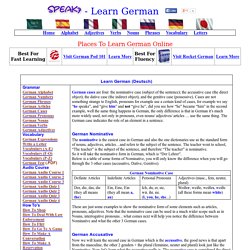

German lessons online: German grammar for beginners - Artikel. తెలుగు Merkels Erzählkabinett. Johannes Merkel Unser Herr Meier gilt als zuverlässiger und strebsamer Mitarbeiter.

Leider hat er aber auch eine unverzeihliche Schwäche: Er kommt morgens oft nicht rechtzeitig aus den Federn. Statt beim ersten Weckerklingeln aus dem Bett zu springen, muss er erst noch eine Runde vor sich hinträumen, dann muss er sich dehnen und strecken, schließlich schiebt er vorsichtig einen Fuß unter der Bettdecke vor, um zu testen, wie kalt es draußen ist, und erst dann bequemt er sich vielleicht, die Decke beiseitezuschieben und aufzustehen. Ich sage, vielleicht, weil es ihm oft genug passiert, dass er sich dann noch einmal umdreht, wieder einschläft, erst eine Stunde später wieder aufwacht und viel zu spät in seinem Büro erscheint.
Weil er die verlorene Arbeitszeit dann aber am Abend nachholt und oft sogar länger bleibt, als er sich verspätet hat, sehen seine Chefs großzügug über diese Schwäche hinweg. Learn German podcast PG1 - Ve haff vays of making you talk! We kick off our learn German podcast with the German theme word "reden" which means to speak or talk.

Before the day is out, you'll know the German translation for: "to talk your head off", "to beat around the bush", "to cut to the chase" and loads more. With our free learn German podcast, you'll learn to speak German like a German native so don't be shy, hop to it and have a listen! Once you're done, don't forget to reinforce what you've learnt by completing our learn german online quizzes. Also if you have a moment, why not send us feedback to help us improve the show. jdm ein Loch in den Bauch reden = to talk the hind legs off a donkey Play learn German audio in new window (11MB) Free Transcript | Bookmark / Share For a translation of any of the words on this page, just double click the word that you're unsure of and the German or English translation will appear. PG1 Transcript – Ve haff vays of making you talk! Texte. PARALLEL TEXTS GERMAN - DAISY STORIES - DAISY MACBETH.
LONWEB PARALLEL TEXTS GERMAN - DAISY STORIES - DAISY MACBETH. German: Learn Languages for Free. Learn German for free online.

Download free audio lessons to your computer or mp3 player and start learning German instantly. To learn more languages, please visit our complete collection of Free Language Lessons.Deutsch - warum nicht? - Web SiteAn extensive collection of introductory German lessons put together by Deutsche Welle.Audio Trainer - Web siteHelps you learn basic vocabulary that is useful for everyday life and improve your pronunciation. The 100 lessons are the result of a collaborative effort between Deutsche Welle and the Goethe-Verlag.Deutsch im Blick - Web siteA free online textbook for learning German from the University of Texas. To learn more languages, please visit our collection: Learn Languages for Free: Spanish, English, Chinese & Beyond.
Support Open Culture We're hoping to rely on our loyal readers rather than erratic ads. Dativ Akkusativ Erklärung (3. oder 4. Fall) Nomen und Pronomen haben vier Formen („Kasus“), in denen sie im deutschen Satz stehen können: Nominativ, Genitiv, Dativ und Akkusativ Die erste Form heißt „Nominativ“.

Sie ist die Form, die im Wörterbuch steht. Practise German free of charge. FSI German Programmed Introduction Course. Foreign Service Institute German Basic Course - Volume 1 Table of Contents. Free online translation, dictionary. How to Master the German Articles-Part II. As you have learned in the first article of this series a fair amount of nouns carry an article or better gender-signal with them in form of an ending.

But what if a noun does not have such an ending? Luckily there is another technique that will help us to deal with exactly this kind of nouns. I call it the Superhero Technique. You will soon understand why. There are three German genders which are often represented by the definite articles in the Nominative: masculine = der neuter = das feminine = die The problem is that this grammatical gender usually has nothing to do with any biological gender. As der, das, die are very abstract and meaningless little words if not only syllables, they are hard to remember. Masculine is substituted by a Superheroneuter is substituted by a fat German baby andfeminine is substituted by Madonna. Now how does that help us to remember the article of a noun? Let’s say you want to learn the gender of the word „Teppich“ (carpet), which is masculine. DeinMichael.
Bidok Leicht Lesen. 1000 Most Common German Words - Top German vocabulary. When starting to learn German, it is always a good idea to memorize the most common words first.

You will quickly begin to understand many more situations when compared to learning your German vocabulary from random sources. This page includes a list of most common German words along with their English translation. This list ranks the words according to the body of movie sub-titles. Note that some words represent different forms of the same word and thus can be grouped into a single entry with a higher combined rank. Some of these words include: German Cases, Nominative, Accusative, Dative, Genitive. German cases are four: the nominative case (subject of the sentence); the accusative case (the direct object); the dative case (the indirect object), and the genitive case (possessive).

Cases are not something strange to English, pronouns for example use a certain kind of cases, for example we say “he speaks”, and “give him” and not “give he”, did you see how “he” became “him” in the second example, well the same thing happens in German, the only difference is that in German it’s much more widely used, not only in pronouns, even nouns/ adjectives/ articles … use the same thing. The German case indicates the role of an element in a sentence.
German Nominative The nominative is the easiest case in German and also the one dictionaries use as the standard form of nouns, adjectives, articles…and refers to the subject of the sentence. Handout: Nominative, Accusative, and Dative: When to Use Them. German cases - accusative, dative, nominative and genitive exercises. German grammar exercises about cases and declension.

You may have already learned that German defines the masculine ("der"), femine ("die"), neuter ("das") and plural ("die") forms of nouns and adjectives. In addition, German employs different cases to define and describe the noun, pronoun or adjective in the sentence. These cases are the nominative, accusative, dative and genitive cases. The nominative case is the subject of the sentence ("The cat is small. "). The accusative case is the direct object of it ("I wear the hat. ").
You will find that in German, the endings for adjectives and nouns will change depending on how they are used in the sentence. How the German Cases work – Nominative, Accusative, Dative and Genitive « JabbaLab Language Blog.